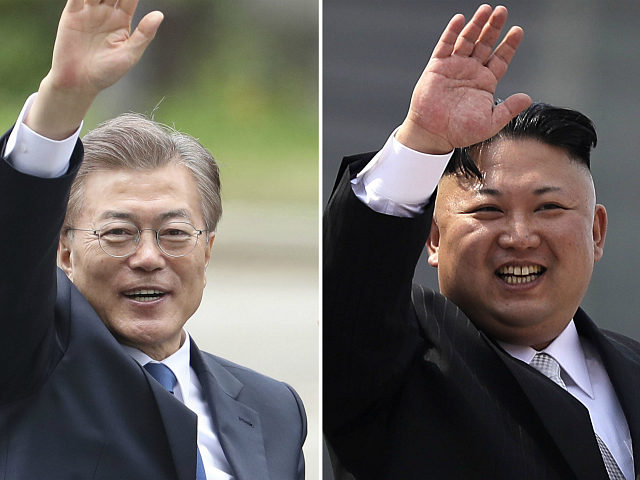Reunification of the Korean Peninsula is a long-stated policy goal of both North and South Korea, although they have very different visions of what unity would look like.
As Friday’s summit between South Korean President Moon Jae-in and North Korean dictator Kim Jong-un approaches, South Koreans remain philosophically in favor of unity but they are not terribly enthusiastic about actually doing it, at least not in the near future.
Reuters postulated on Tuesday that when South Koreans think of “unification,” what they really mean in the short term is “peaceful coexistence.” In theory, the first step toward unification could be taken on Friday as Moon and Kim agree to begin the process of formally ending the Korean War at long last. The two leaders cannot end the war unilaterally, no matter how well the summit goes, because too many other interested parties have to sign off on the paperwork, including the United States.
In practice, South Koreans are understandably worried about the enormous cultural and financial costs of reunification with the brutal and impoverished North. Most of the estimated $5 trillion in reunification costs would fall upon the South, a fact the man on the street in Seoul is keenly aware of. The mind reels at what would happen if the peninsula was reunified and North Koreans were asked which side of the former DMZ they would prefer to live on.
As a result, poll numbers for reunification have dropped even as North Korea’s 2018 diplomatic opening and Winter Olympic “charm offensive” rolled along, and the prospect of a unified peninsula became slightly less improbable.
“Public support for reunification has declined in the South, where 58 percent see it as necessary, down from nearly 70 percent in 2014, according to a survey by the Korea Institute for National Unification. A separate government poll in 1969 showed support for unification at 90 percent,” Reuters reports.
Reunification is not even a discussion item on the agenda of the Moon-Kim summit, even though just about every joint entertainment and sporting event between North and South ends with happy songs about the beautiful dream of a united Korea.
More hawkish South Korean administrations of the past envisioned North Korea weakening until its government collapsed and unification involved Seoul picking up the pieces. The dovish Moon replaced that policy preference with the Three Noes: “No desire for the North’s collapse, no pursuit of unification by absorption, and no pursuit of unification through artificial means.”
Other reasons reunification is likely to remain a dreamy aspiration include the conflicting interests of powers like Russia, China, and the United States, which have sharply conflicting relations with the two Koreas and would not relish a peninsula controlled entirely by the Korea they dislike; younger generations on both sides of the border who have no historical memory of a united Korea; and the total incompatibility of nearly every technological and civic system in the two countries.

COMMENTS
Please let us know if you're having issues with commenting.